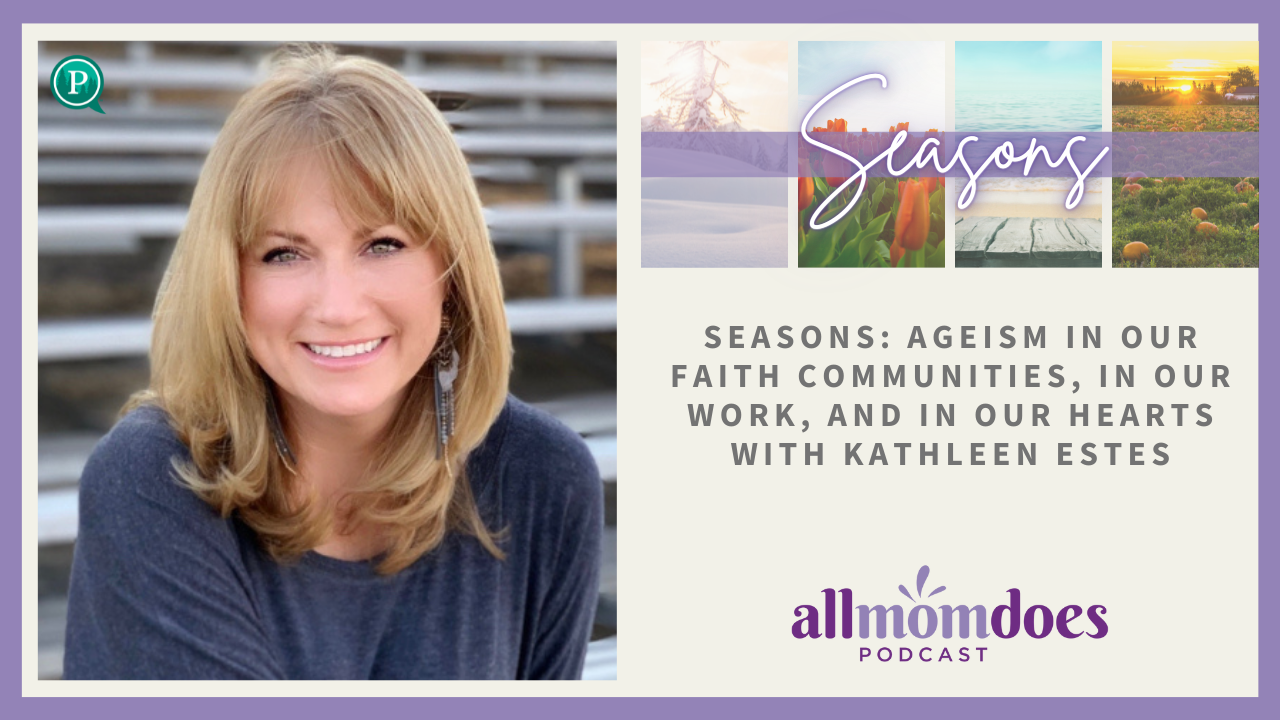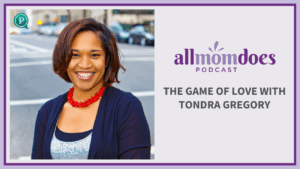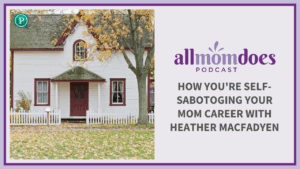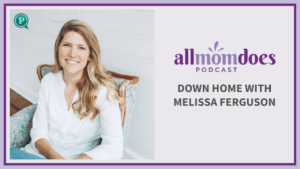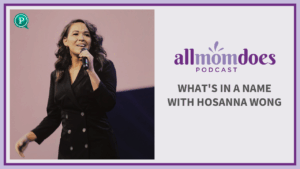Kathleen Estes has been in worship ministry since childhood, in a career that has now spanned a few decades. And as she is entering a new season of life, she’s got some powerful insights into why it can be so hard to embrace new seasons in a culture that can’t seem to gracefully accept aging.
Check out this fascinating episode with Kathleen and Julie Lyles Carr as part of The AllMomDoes Podcast new series on Seasons.
Interview Links:
- Find Kathleen Online | Instagram | Facebook | Twitter | Podcast
- The AllMomDoes Podcast with Hollen Frazier of All God’s Children
Transcription:
Purposely. Your life. God’s purpose. Listen at onpurposely.com.
Julie Lyles Carr: Today on the AllMomDoes podcast, we are in a series on seasons, seasons of life. I still keep getting surprised that things change in my emotions and the things and tools and ways in which I look at those changes. So I’m so excited to have one of my dear friends on the podcast today because she has been with me through a lot of seasons of life. Kathleen Estes, thanks so much for being on the podcast.
Kathleen Estes: I am so honored to be here today. I love your podcast and it is just a pleasure to get to spend some time with you here.
Julie Lyles Carr: Well, you’ve had me over on your podcast. We’ll get your podcast link in the show notes. Rebecca can do that for us. And you have a YouTube channel where you talk about a lot of things regarding seasons. So it was about time that I had you over to my online house. So I’m very glad that you’re here today. Kathleen give listeners a snapshot of where you are in the world and what you do in your daily life and all the things.
Kathleen Estes: All right. Well, I currently live in Austin, Texas. I am on staff at a church called Life Austin as the worship and creative arts pastor. And I’ve been there for eight years now.
I moved here with my husband and two boys, and I have just launched my eldest to college. So I’m going through that transition. He is a student at Colorado University. He’s on the football team there. And so I’m excited about that. My youngest is 16, so he’s about to be a junior and plays varsity at Lake Travis high school here in Austin. So I am a full-time football mom. Absolutely love that. I’ve been married for 27 years to my husband, David and I have a dog who is a big baby. Apollo. And you hear him in the background? I do apologize.
Julie Lyles Carr: That’s alright. That is okay. Well, Kathleen, you have had so many fascinating seasons in your life. And one of the little pieces of trivia that I know about you is that you only recently became an American citizen. You were actually born in the UK. So take me back in the time machine and let’s talk through that season where you were born in the UK to parents who originally from the UK and when you first came to the United States.
Kathleen Estes: Yes. My parents met in the Royal Air Force and wanted a better life. So they moved to America and came all this way and somehow landed in New Jersey, which I’m always like, if you’re gonna come that far, why did you stop in New Jersey? But I actually loved growing up in New Jersey. And I, at that point in my life, I really identified with wanting to be American and fit in, I think, going to public school. There was that pressure to just wanna belong.
And so it wasn’t until I got into my late teens, that I really appreciated the fact that I had a British heritage and what that meant, which was awesome. But then it started getting complicated with travel. And I wanted to be a part of what America is. Being able to vote, be, be belong.
And so I just about three years ago became a US citizen and I’m very proud to be an American. And I’m proud that I can keep my dual citizenship and also love being a part of Great Britain as my heritage.
Julie Lyles Carr: Do you remember making that transition going from where your parents had a whole lot of family, a lot of extended family, deep roots in the UK to coming to the US? Do you remember any of that?
Kathleen Estes: You know, I was very young. I was a toddler. My mom is the eldest of 11, so there, there definitely was a lot of aunts and uncles and cousins. And then we came to the US and it was like just our extended family. And I think the impact of that is that I am really close with my sisters. Like we were a very tight knit family unit. And so I think it, it had a positive impact in that way.
Julie Lyles Carr: Now you went through a season with your sisters in which you guys were on the road, performing. You guys went into a music career at very young ages. Talk a little bit about that season.
Kathleen Estes: Yes, my my sisters and I sang together, it was that sister harmony very Wilson Phillips kind of vibe. But of Christian music. And so we traveled, I got a recording contract with a record company called Star Song when I was 16 years old. We traveled every weekend. We had a motor home, my dad ran sound, my mom would speak some. And she made all our outfits, our dresses and costumes. And it was a family affair and it was a great experience.
I loved it, my sisters and I then moved to Nashville, Tennessee when I was around 20. And it was, it was a major shift because that had been our whole lives. Like I knew from the time I, you know, was in elementary school that I wanted to be a singer. I wanted to be a pop star. And so of course, but I wanted to do it for Jesus.
When I moved to Nashville and started attending a local church every weekend, as opposed to us traveling and being the ones ministering at church every weekend, I really fell in love with the local church and I fell in love with leading worship. It no longer was like, I wanna perform be quiet and listen to me. It was, I wanna encourage you to sing.
It was like a light switch just went off in my soul that I really wanted to be more about leading people in worship and encouraging others to sing, as opposed to wanting to perform.
Julie Lyles Carr: Now, as part of that transition, you stayed in the Nashville area. And of course, now we can look back at wedding pictures and things and think, okay. I was still kind of a baby when I got married. But within that culture at that time, you were a little bit older when you met your husband and got married. You were in your mid to late twenties. He was in his early thirties. What was that season like where you’re making a transition away from a model that you’ve known, where you are the one touring with your sisters, and now you have found a different passion within the same discipline of music, but now it’s a different focus. And you’re also encountering a season of what must have felt like singleness until you met your husband, David.
Kathleen Estes: Yes, I am so thankful I’m not dating right now. I feel for any view out there that are in that season. I met my husband at church. He played piano on the worship team and I sang, and so honestly it took me a while to want to shift, to I, I, wasn’t one of those girls that grew up always wanting to be married. I grew up, I wanted a career. And so it definitely was an interesting season for me to fall in love with a man and wanna be a wife. To fall in love with a local church and not want to travel. To fall in love with leading worship and not wanting to be a rock star. Like it was kind of all three of those things shifted in my heart around the same time. So they kind of all dovetailed together. I don’t think I loved being single. I don’t think I loved like dating. I didn’t date very much. I had a lot of guy friends.
I was one of those girls. It was easier for me to hang out with the guys. And so for me, it was a transition of really beyond my sisters, developing friends that were girls, which was great. And, you know, I think incredibly health healthy now, I I’m a cheerleader for all other girls, you know, but that was a transition for me. And I think falling in love with my husband and the security of that relationship enabled me to enjoy more friendships with females as well.
Julie Lyles Carr: Interesting. Interesting. Now you make this transition. You get married, you two go into ministry together, and there are a lot of iterations of what that has looked like throughout your lives. But one of the chapters of your life, one of the seasons of your life that I have seen you be able to express so much transparency and hope and kindness and compassion is: here you’ve made this big transition. So now a few years in, let’s start a family and you and your husband struggled mightily with infertility issues. Talk about that. When you enter a season where you’ve made changes and you feel like these are God led changes in your life, that should, it feels like naturally lead to this next thing. And yet that next thing is not happening. What was that like?
Kathleen Estes: That was probably the most difficult and dark night of the soul journey for me, because I had lived a very blessed life. You know, my dilemma was, is my Starbucks gonna be iced or hot? You know, it’s not like I had this, a lot of trials that I really had to walk through. And so that season I thought, okay, You know, Jesus was stamping approval on whatever the desires of my heart were and when my husband and I decided we wanted to start a family, like most, we just thought, okay, this is in our control. Now we’re gonna start a family.
And during that season was also when 9/11 happened. And we were at a church in Nashville. We were both vocationally. I was doing acting and interior design and my husband was in the record business and our church decided, we’re gonna respond. We’re gonna go plant a church in New York.
And so my husband and I just felt that like kick in the gut from God, like we’re supposed to go do this. And so we literally left our careers, raised money as missionaries and went to Manhattan to be a part of just ministering hope to the city. It was one of those moments where we thought this is why we don’t have kids yet.
Like God’s withheld children because we would not have had the faith to respond in this moment if we were also being responsible for a family. And so, you know, in your mind, you like justify and think you figured out how God is thinking about things. And so that enabled us for probably about five more years to not be worried about it cause we were very much engaged giving our whole selves to ministry.
Then another five years went where we were now launching another church as lead pastors in Philadelphia, connected with the same church. And so it’s like, okay, this is why we don’t have kids. We’re now launching out and birthing a church, you know?
And so we kind of always justified it, but all of a sudden it was 15 years into our marriage and we didn’t have kids yet. And my biological clock was ticking. So we started to try to figure out what was going on and there was no explanation of why we were struggling medically. And so we had the opportunity through someone in our church to be a part of a IVF program at the university of Penn, we were in Philadelphia at the time and it just felt like, wow, God look what you did. You opened this door. And so we went from like no intervention to the big guns of IVF. It was, I got pregnant. And we were so excited and then I sadly miscarried. And that just, it was like the rug got pulled out from underneath us because it’s like, here, you’ve lived this life of faith, you’ve seen God do these amazing things. And now this, you know, the first commandment in the Bible be fruitful and multiply. We can’t. And it was so heartbreaking knowing God’s the one that gave us these, this desire to parent. And there’s nothing we can do to make this happen. And so we had been where we were doing these confession sheets every morning, you know, we were just like all in and I finally just got so sick of it.
I was like, look, I don’t think God’s, I don’t think I’ve missed what God’s asking me to do and that’s why I don’t have kids. So I just like shut it all down. Like I’m not even asking, I’m not even praying anymore. I’m letting this go.
Julie Lyles Carr: I mean, it’s such an amazing, it’s such an amazing experience and I think in it, I mean, I know ultimately where God led, but there had to be times in that season where you’re thinking, what is the purpose of this season? Because honestly, Kathleen, I think sometimes we try to take a season that’s hard and part of how we get through it, and this is not wrong or bad, I think sometimes this is a survival skill, is we try to find the meaning in it.
We, we try to find the people who need this message or need to know they’re not alone. And I think all of those are great things. But sometimes to just sit in a season and be willing to say this doesn’t make sense. Did you feel permission to do that? Did you feel pressure from the faith community to not do that? I mean, what did that feel like when you’re in a season that just doesn’t seem to have any resolve?
Kathleen Estes: I definitely, there were a lot of tears and a lot of why, but I definitely felt that, okay, God, your ways are higher than mine. And definitely held onto that trust that ultimately he would use it for good. I truly believe that all things worked together for good, for those who are called according to his purpose.
And even if that good was being able to share the sorrow of miscarriage and loss and the shame of dealing with infertility, being able to talk about it, the response that I received of, of women that were so felt so alone in their journey definitely gave me a sense of purpose, even in those darkest moments.
And I think that’s part of it, of being authentic and being vulnerable and being willing to say, I don’t get this. I don’t understand it. I don’t have answers, but this is what I’m walking through. I think even the purpose in that helped me through that season.
Julie Lyles Carr: Right. Now, the beautiful part of the next season you walked into was when you adopted your sons from Ethiopia. And they came to you through an entity called All God’s Children. We’ve had Hollen Frazier on the show before we’ll get her interview on as well on the show notes, because it’s such a powerful story as well. And I actually got to pick up with your story and you and I got to know each other when the boys were quite a bit younger and you moved to Austin, Texas with the boys, and I’ve only known you in a sense as this woman who has been a mom. And in your season, in your career in being a praise and worship pastor. Now, obviously there have been seasons embedded in those seasons, but that’s the season in which I came to know you.
And you and I sat down a few months ago and we were reflecting on, hmmm, we have been in this mom season. Doing the kid things and all of that. And now kids are beginning to launch and kids are going into their own lives. And this season of being in super hands on all-in-it motherhood, it’s not that we’re gonna end our season of motherhood. Motherhood is a season that doesn’t stop, but they’re iterations within our mothering seasons that change.
And you and I had this really great conversation about both that, and on the career front, what begins to change? You know, I think sometimes we think we are guaranteed a certain career or position or trajectory that’s going to last until we decide we’re ready to retire. Right. But the reality is for a lot of women, whether we like it or not, we get aged out of certain things faster than our male counterparts do.
And that’s the part of seasons I would love to talk to you about at this stage, because, we are both in a season where, what was considered the prime window for you to be on stage for me to be on stage, whether we like it or not. There are a lot of churches out there that begin to show you the stairs down the stage when you hit a certain age. So what has it been like for you, with your boys now growing up and hitting adulthood with the age and stage that you are in embracing that and wanting to stay very active within the faith life and within ministry, but also acknowledging, huh? This may wrap up. Where are you in all of that season right now?
Kathleen Estes: Honestly, this year is the first year I’m like admitting that I’m in season. I, I feel like I have tried to deflect and tried to just work hard, you know, the whole anti-aging thing, like just very consumed with it. And I think this year I just felt a sense of freedom. Like, okay. Where, where do I need to really find freedom?
And one of it was in embracing the age that I am, being willing to talk about the age that I am, and go into a goal of aging well, as opposed to anti-aging. I want to age, I want to get older. I want to experience all that life still has to offer. And so I feel like this year has been my moment of embracing that.
And as far as my career. I think it’s been really once again, another journey of trust in, in God that he has a next and a next and a next that it doesn’t end and this is it. And I think part of it is helping raise up others, helping to shift into that mode where you don’t have to do it all yourself. And if you’re not the one that gets to lead that song or do that teaching that it’s okay. That you’re now helping mentor some others. And I think in that there’s a new level of beauty that more people still wanna hear what you have to say. I think when we try to grasp and tightly to things is when it can start being really unattractive. You know, I, I definitely try to be very self-aware and look at what I’m wearing. You know, I don’t wanna be trying to look too young. At the same time I don’t wanna look outdated and make it worse. So it’s like finding that, that, that tension of staying relevant and yet not trying to use phrases and words that just sound ridiculous when I say them.
Julie Lyles Carr: Right, right. It is a very interesting tandem. And what I want listeners to know is you find yourself arriving in this stage sort of unexpectedly. It’s, it’s a little odd because you know, you carry the banner, you carry the flame for quite a while in a certain age of your life, where you are the pioneer, and you’re the one leading the way. And you’re the one raising kids in an era in which nobody’s raised kids in this era before.
And you find yourself being able to engage in technology and platforms that haven’t been around before. And so there’s all this pioneering spirit to some degree that seems to be there when it comes to earlier stages of career and kids and all the things. And then all of a sudden you have an odd moment where somebody invites you to a life group that’s for a certain age group. And you don’t think that’s your age group, and then you look at your driver’s license and that’s a true story. I was like, not the driver’s license part. I know how old I am, but I did have somebody invite me to something. I was like, that’s so weird they would invite me to the, oh yes, that is my age and my stage. Wait a minute. What?
So it is an interesting thing to find yourself transitioning to that place, but it, it brings up a question that I have for you when it comes to our faith communities and I have not, I confess I have not probably been appropriately sensitive to this. I know the word of God encourages us to look at people who are in older stages of life than we are as depositories of incredible wisdom.
But Kathleen, I gotta tell you, I think in a lot of our faith communities and now in a lot of other places, we just don’t seem to honor and validate those who got a little more life on them. And particularly when I look sometimes at the stage and who’s on the stage and who’s talking to us, I sometimes see a gap there.
How do you navigate that? How do you keep yourself encouraged? How does all that work for you?
Kathleen Estes: I just got back from celebrating my dad’s 80th birthday. And it was such a beautiful experience to sit and hear the stories from him of what life was like. And I laughed at this. He talked about, you know, they’d listened to the radio cause they didn’t have the TV yet.
And they’d sit around the radio and listen. And I was like, huh, kind of funny. We’ve gone back to that one podcasting, back to broadcasting. You know, like it all comes back around, but just recognizing the treasure in wisdom in those who have, have been around the mountain a few more times than us, those that knew what it was like to live life without a smartphone or different, different things.
And I think we’re living in an era where we are so polarized by people that don’t think like us. And so there’s even more value in listening to a generation that might have a different perspective on some things that we don’t just shut them down instantly because they’re ignorant of how we’ve evolved and how we’ve gotten better, but truly trying to hear what they wanna, they can teach us and also having a patience to try to teach them, you know, because ultimately if we’re gonna lead, we have to be a great follower. We know that. We want others to follow us, we need to know how to lead. So it’s both, and it’s just truly embracing that in a new way that we might now be that little bit older one. I think it’s even more important for us to still be demonstrating to the generation behind us that we are looking to those that are still beyond us and seeing the value, not discrediting them based on, on maybe one comment that they make that’s just so politically incorrect now, like really trying to help one another and hear one another’s hearts. You know, I feel like that’s an important part of this particular season that we get to be the age we are and play the part that we get to play in this particular moment.
Julie Lyles Carr: That is such wisdom to remind us that, yes, if we are looking to an older generation and for most of us now, my grandmother lived to be 102, so they weren’t many people ahead of her that she was able , at that stage of life to say, okay, well, I’m also still, you know, watching and following this person. But for most of us, there is usually always somebody younger and there’s usually always somebody older. And in that scenario, in that position, we always have something we can learn. We always have something we can share. And I love this wisdom of being patient with a generation that maybe it feels a little dated and maybe it feels like there are some things that you go, Ooh, I don’t know if I would’ve said that that way, but to have that patience so that we can function as a family of faith, in which many ages, stages, seasons of life wisdom that’s been hard-won, all of that can come into the mix. And we can all be together in a way that our combined experiences and wisdom are so very powerful. Well, Kathleen, as always any conversation I get to have with you, I learn so much. I so appreciate you taking time to be on the podcast today. Where can listeners find out more about you find you on Instagram, all of that?
Kathleen Estes: Yes. The Kathleen Estes on Instagram and I have a YouTube channel that’s just Kathleen Estes. And so I would love for you to stop by.
Julie Lyles Carr: Excellent. All right. Well, thanks so much, Kathleen. And we gotta get that lunch in, in real life. Listeners, be sure and go to the show notes. You’ll find all those links there and, you know, send a big thank you to Rebecca when you have a second, because she puts that together every week and we will be back with another episode on this new series on seasons.
I’ll see you next time on the AllMomDoes podcast.
Follow this podcast:

